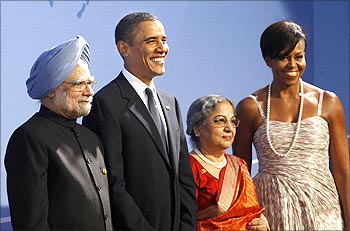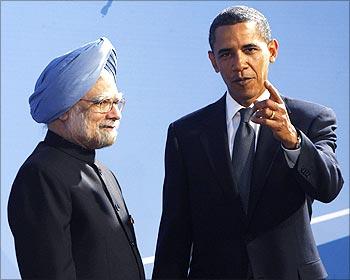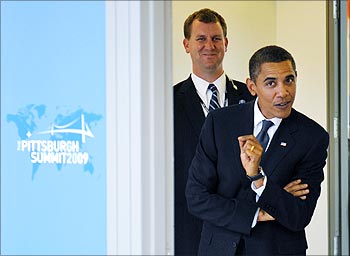 | « Back to article | Print this article |
Obama greets PM warmly, looks forward to next visit
US President Barack Obama is looking forward to the state visit of Prime Minister Manmohan Singh to Washington in November.
Singh, who will be paying the first state visit of the Obama Administration, and his wife Gursharan Kaur, were warmly greeted by Obama and First Lady Michelle at a dinner hosted by the US president for the world leaders attending the G-20 Summit on Thursday.
Singh and Obama greeted each other and were seen talking before they moved to dinner.
Obama greets PM warmly
India, meanwhile, made it clear that it cannot accept any emission reduction targets in the climate change negotiations heading for a climax in Copenhagen later this year, but expressed the hope that there would be consensus on financing emission control programmes in developing countries aided by technology transfer.
New Delhi also rejected the possibility of phasing out subsidies on energy pricing saying while it was an objective it would not be implemented at the cost of poor people.
Obama greets PM warmly
India's position was enunciated on the sidelines of the G20 Summit here by the Prime Ministers Special Envoy on Climate Change, Shyam Saran, who attended the just concluded conference in the United Nations and the Major Economies Forum last week in Washington.
"We will not be able to undertake emission reduction targets of the kind the developed countries are obliged to take under the United Nations Framework Convention on Climate Change.
Obama greets PM warmly
Group of 20 leaders are working to seal an agreement on phasing out subsidies for fossil fuels at their Pittsburgh summit but have no fixed date for the change, G-20 officials said.
Many G-20 governments give tax breaks and direct payments to companies that help them produce coal, oil and other fossil fuels that cause greenhouse gases blamed for global warming.
The subsidies account for tens of billions of dollars alone in the United States.
The United States and the European Union have pressed developing economies such as China, India and Russia to stop subsidizing fossil fuels, saying such a move would help a global push to reduce emissions of greenhouse gases.
Obama greets PM warmly
Taking on board the concerns of India and other countries, leaders of the G-20 countries comprising the world's major economies have decided to continue the stimulus package to quicken global economic recovery.
The leaders from the United States, the United Kingdom, France, China and others reached a historic agreement to put the group at the centre of their efforts to build a roadmap for durable recovery, avoiding the financial fragilities that led to the crisis.
Obama greets PM warmly
"Today, leaders endorsed the G-20 as the premier forum for their international economic cooperation. This decision brings to the table the countries needed to build a stronger, more balanced global economy, reform the financial system, and lift the lives of the poorest," the White House said in a statement after US President Barack Obama hosted a dinner for the heads of government that included Prime Minister Manmohan Singh.
Amidst demands by some European government heads that an exit policy should be made to end the stimulus package agreed in London, the draft declaration of the summit is believed to have stressed the need for continuance of the booster dose notwithstanding green shoots of recovery seen in some countries.
Obama greets PM warmly
At the London Summit in April, the G-20 leaders agreed to pump in $1.1 billion to lift the global economy hit by last year's financial crisis triggering the collapse of many leading financial institutions.
The draft declaration is understood to reflect India's view that it was too early to adopt an exit strategy from the stimulus package, but left it to individual countries to adopt measures after some time, Indian officials involved in the hectic negotiations said.






